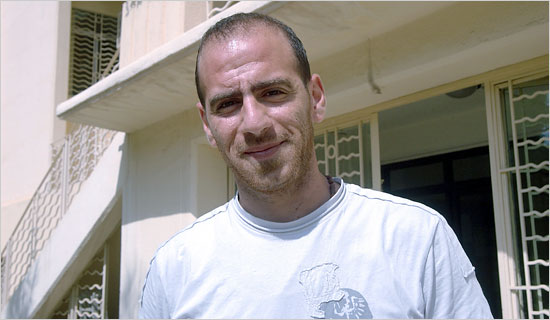 By Daniel Williams Bloomberg News, On Sept. 19, Edgard Baradhi heard an explosion near his house in the Sin el-Fil neighborhood of Beirut. A car bomb had killed Antoine Ghanem, a member of Parliament, and six other people. He went out and pulled some of the dead from their vehicles. "My hands were full of blood."Baradhi, a 29-year-old Maronite Christian electrician, is moving to Qatar this month, joining thousands of Lebanese of all faiths and political inclinations who are emigrating for tranquility and higher-paying employment.
By Daniel Williams Bloomberg News, On Sept. 19, Edgard Baradhi heard an explosion near his house in the Sin el-Fil neighborhood of Beirut. A car bomb had killed Antoine Ghanem, a member of Parliament, and six other people. He went out and pulled some of the dead from their vehicles. "My hands were full of blood."Baradhi, a 29-year-old Maronite Christian electrician, is moving to Qatar this month, joining thousands of Lebanese of all faiths and political inclinations who are emigrating for tranquility and higher-paying employment.
Job recruiters and analysts say the outflow is a double whammy: drying up the pool of skilled workers inside Lebanon and reducing salaries for some Lebanese outside."This is a buyer’s market for Lebanese abroad," said Carole Contavelis, who heads Hunter International, a Beirut recruitment agency. "Nobody’s in Lebanon anymore. The good candidates are out."
Across the Middle East and North Africa, it’s rare to have a conversation with a young person who doesn’t want to emigrate to the United States, Canada, Europe or Australia. Internal conflicts scar countries from Morocco to Iraq, and unemployment across the region tops 10 percent.
In Lebanon, the jobless rate is 20 percent, according to the Labor Ministry, and the country copes with a particular mix of sectarian tensions and dangerous politics. Half a dozen pro-government officials have been assassinated in two years, Parliament has met only once in nine months, and rival legislators are at odds over whom to elect when the term of President Emile Lahoud, 71, ends Nov. 24.
All this goes on against a backdrop of the war last year and fears of a clash between the United States and Syria over influence in the country.
Many Lebanese fled during the war, which killed about 1,000 civilians and combatants, destroyed homes, businesses and roads, scared off tourists and forced Lebanon to beg for aid.
Some people returned when the war ended, only to leave again, driven away by a bitter power struggle that pits the opposition and the government.
"They view instability as chronic instead of episodic," said Eugene Sensenig-Dabbous, an analyst at the Lebanese Emigration Research Center in Beirut.
Bishops of Lebanon’s Maronite Church estimate that one million, or one in four, Lebanese left during the past year. "The country is on the edge of an abyss," they said in a Sept. 25 public letter urging politicians to settle their differences.
The General Directorate of Emigrants doesn’t provide any statistics, although it does publish information about the Miss Lebanon Emigrant 2007 competition, with contestants from 12 countries.
Lebanon hasn’t conducted a census since 1932 because of the sensitivities of sectarian demography.
"No one wants to know the real population of Lebanon," Sensenig-Dabbous said. "And no one wants to say which group is sending how many abroad." All religious groups are fleeing, he added. "This is not a sectarian issue," he said.
The emigration center estimates that the current exodus is bigger than the flight during the war last year.
In an April survey of 1,600 Lebanese, half of them wanting to emigrate and half of them who already have left, 31 percent blamed their decision to leave on political instability, 24 percent cited politics and 18 percent said there was a need "to secure their future."
Just over 73 percent in the survey didn’t plan to return permanently.
Mustafa Shahrour, a Shiite Muslim computer technician, says he’s going to Saudi Arabia this month to work in a restaurant. "Everything here has become about whom you support, if you’re Shiite or Sunni or Christian," he said. "I don’t want to live like that."
Sharhour, 26, wants to get married, though without money for a house and furnishings, women he knows aren’t interested.
He makes $300 a month as an electrician in Beirut and will pull in $1,000 in Saudi Arabia. "I’m not coming back until Lebanon is a secular state," he said.
Marriage is also on the mind of Baradhi, the Christian electrician, who will join his girlfriend in Qatar. She teaches finance and earns $6,000 a month, compared with $1,200 as a professor at St. Joseph’s University in Beirut. Baradhi makes $300 a month in Lebanon and expects to make $800 in Qatar.
"All my friends call from America or Canada or Qatar and say, ‘Come on, you’re wasting your life,’ " he said.
Contavelis, of Hunter International, said the large number of emigrants was causing salaries to drop for some Lebanese abroad, though they’re still higher than the pay at home. Offers for top executives in the Gulf states have fallen to $4,000 a month from $10,000; for assistant general managers, they’ve halved to $1,500.
There is also some dispute about whether the migration harms or helps Lebanon.
Guita Hourani, the emigration center’s associate director, said that "a significant brain drain is taking place that might hinder competition and economic growth."
In a report issued this month, she noted that remittances to Lebanon had decreased as emigrants stayed away longer.
Yasser Akkaoui, editor of the Beirut business magazine Executive, says emigration is a boon, making the nation a global entity.
"Lebanon has outgrown its borders," he said. "On paper, Lebanon does not make sense, but it has learned to survive."



